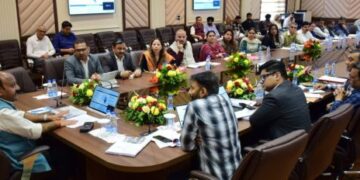SRINAGAR: J&K is on a mission to become one of the largest clean energy-producing UT in the country with an objective to reduce dependency on conventional sources of energy and enable J&K in attaining self-sufficiency in its energy needs.
J&K Government recognizes that renewable energy can also significantly increase J&K’s and the Nation’s energy security.
To achieve this milestone, the work is going on to implement the Government of India’s Grid-connected Rooftop Solar Scheme, Phase-II for the residential sector in Jammu to ensure that the electricity needs of the city are fully met from solar energy.
Under the project, 200 MW grid-tied rooftop solar power plants will be installed on 50,000 residential buildings in Jammu city by the Jammu and Kashmir Energy Development Agency (JAKEDA) under its “Solar City Mission” at an estimated cost of Rs 1040 crore. The project will be completed by March, 2024 and will have a lifetime of 25 years.
The Rooftop Solar Programme will provide subsidized installation of solar power panels on residential houses at the cost of Rs. 58,739, Rs. 53,995, Rs. 52,594, and Rs. 51,309 for Category-A (Up to 1 kW), Category-B (> 1 kW to 2 kW), Category-C (> 2kW up to 3 kW), and Category-D (> 3 kW up to 10 kW), respectively.
The Central Sector Scheme provides a central subsidy component of 40% of the project cost and a state subsidy component of 25% of the project cost for the installation of solar power panels, below 3 kW capacity, beyond which the central subsidy component remains at 20%. The subsidy is provided to the beneficiaries through the DBT mode.
An official said that these rooftop solar power plants will be connected to the grid on a net metering basis. The investments made by the beneficiaries will be recovered at a rate of 25% annually on account of the saving of energy, with a payback period of approximately 4 years.
“With the implementation of the project, J&K will benefit from the generation of approximately 280 million units of energy annually, with a corresponding reduction in carbon emissions of approximately 5.44 million tons, besides reaping gains from savings on account of inter-state transmission losses to the tune of 224 million units,” he added.
The generation of solar energy through the Rooftop Solar Programme will also help the energy-deficit UT of J&K in supplementing its energy needs, while assisting the DISCOMs in achieving the Renewable Purchase Obligation (RPO) targets of 10.5% as fixed by the Government of India.
The project will also provide employment opportunities to local youth. Based on employment estimates, it is calculated that the 1 MW rooftop solar PV project generates a total of 40 full-time equivalent (FTE) jobs over the 25 years expected lifetime of the project, which includes highly skilled personnel for business development, design, sales, procurement, and project management; one-time jobs for construction and installation of the rooftop PV system; and unskilled resources required annually for cleaning activity of the plant.
The scheme mandates implementing agency, viz. JAKEDA to provide regular quality supervision and certification of the quality of material to be installed; periodic monitoring of physical progress and third-party quality checks from MNRE-approved test centres; provide free maintenance for a period of 5 years post installation; install bi-directional net-meters; and ensure project completion within the given timelines.
J&K has a good potential for solar energy and the renewable energy capacity would help to bridge a part of its power requirement. Under the new budget in PM KUSUM Scheme, 375 Solar Water Pumps will be installed in 2022-23 providing electricity benefit to 47159 souls, direct agriculture benefit to 18750 souls, and indirect agriculture benefit to 160000 souls.
Notably, Prime Minister Narendra Modi inaugurated a 500-kilowatt solar power plant at Village Pali of Samba which will make it India’s first “carbon-neutral Panchayat”.






